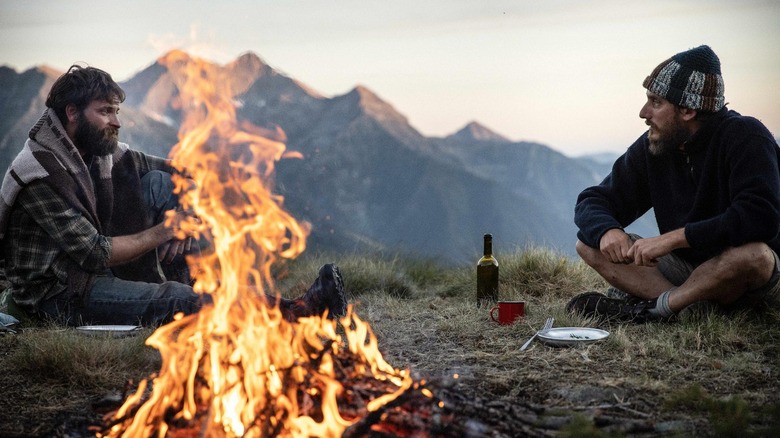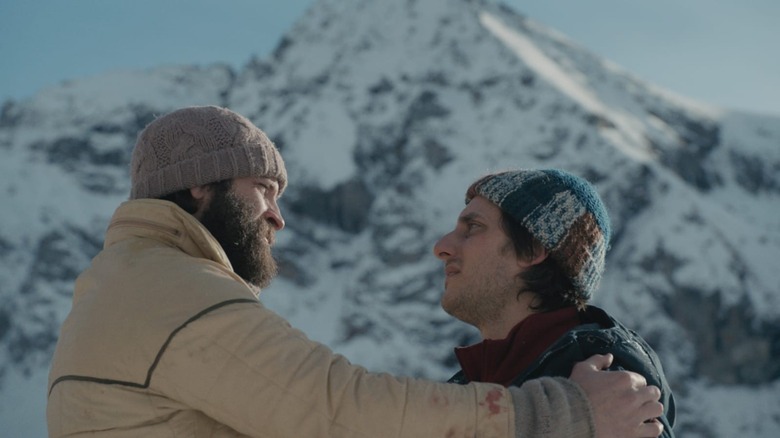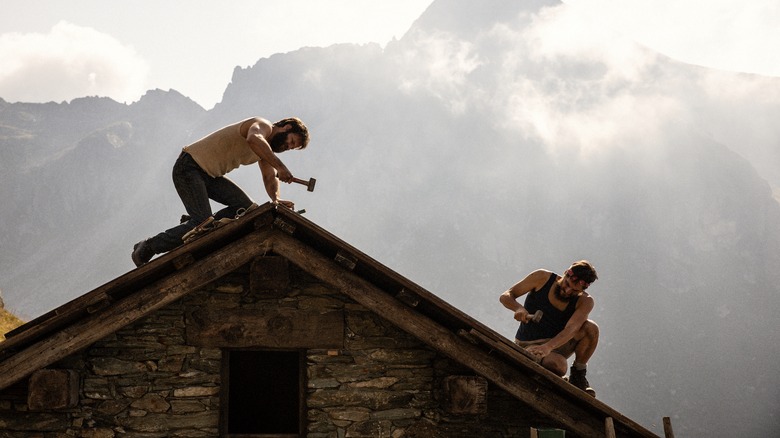The Eight Mountains Review: A Gorgeous And Soaring Epic About Friendship, Aging, And Regrets
It can be surprisingly difficult to find a movie with an authentic, lived-in sense of how friendships truly unfold over the course of many years. What we so often get instead are hollow pastiches and tired tropes that hardly scrape the surface of what actually draws two individuals together from very different walks of life — and why. Maybe there's something to be said for a more matter-of-fact approach that gives such weighty topics room to grow, recede, and adapt at a glacial-like pace.
While that's usually considered a critique, this is at least one of the many reasons why "The Eight Mountains" stands in such stark relief from its peers. In the opening act set in 1984 Italy, two children become fast friends over the course of a single summer in the mountainous village of Grana — not through some shared trauma or because they instantly recognize some deep, soul-baring connection to one another. Instead, it's simply the result of geographical proximity along with, well, a lack of any other real options.
11-year-olds Pietro (Lupo Barbiero) and Bruno (Cristiano Sassella) couldn't be more different, the former a city boy visiting the countryside on summer vacation and the latter a local who describes himself as "the last child in the village" that has steadily become a ghost town over the years. This pervasive fear of being left behind turns out to haunt both of our main characters as we soon jump forward in time linearly and catch up with them at different stages of their lives. Their choices take them on winding and diametrically opposed paths, linking each segment of the film and each recast (Andrea Palma portrays Pietro and Francesco Palombelli as Bruno in brief appearances as adolescents before Luca Marinelli and Alessandro Borghi take over the respective roles as adults for the rest of the picture) with a strong, connective through-line that never once lets the storytelling sag.
In this latest co-direction effort by Belgian filmmakers Felix van Groeningen and Charlotte Vandermeersch, adapted from author Paolo Cognetti's novel of the same name, patience is the name of the game.
Small beginnings
Thanks to the ongoing voiceover narration by an older and noticeably wistful Pietro, a twinge of melancholy runs through the initial portions of the Italian-language drama, even as the first 30 minutes or so of the nearly 150-minute epic depicts typical and lighthearted moments of childhood innocence. Aided by a constantly roving camera, as if even the lens itself struggles to capture the fleetingness of summer, the tone in these early moments is steeped in memory and regret. The deliberate pacing and daunting runtime might have some running for the hills, admittedly, but those who find themselves on the same wavelength as this quiet, confident, and constantly engrossing mood piece will be rewarded with a profoundly moving experience — one that will garner comparisons to Terrence Malick's filmography and even "Call Me By Your Name" or "Brokeback Mountain" (although, fair warning, viewers looking for romance will only have subtext to go on), but very much stands on its own.
As much as Pietro and Bruno's friendship takes centerstage during this segment, however, it's the dynamic interplay between the kids, their rugged surroundings, and Pietro's father Giovanni (Filippo Timi) that serves as the linchpin to the greater unfolding drama. After the father and son successfully make the ascent to a particular mountaintop (which will take on greater meaning later on), the determined pair recruit Bruno to make a challenging trek to a nearby glacier. Here, Giovanni's awestruck declaration that "Glaciers hold the memories of past winters" hits young Pietro in ways he's not quite old enough to process just yet. It's only when he later realizes that this is the last time that all three of them were ever together that he begins to unravel the complicated and swirling emotions that continue to plague him as an adult.
It's only when we look back through the fog of memory, after all, that we can finally come to terms with the choices we made and the paths not taken.
The cabin in the mountains
Kids grow up, circumstances change, and friendships fade. That's simply par for the course for most experiences, but "The Eight Mountains" charts an almost fateful trajectory where Pietro and Bruno reconnect again and again over the long decades. No less than 40 years pass throughout the film, but the immediacy and almost casual flow of time makes it surprisingly easy to attune one's senses to what van Groeningen and Vandermeersch are attempting to communicate.
After a chance meeting as young adults, the two don't see one another for another 15 years. While Bruno largely stays put out of a sense that the Alps are simply where he belongs, Pietro can't wait to put his childhood and his fractured relationship with his father behind him. Ironically, this only lends to his creeping feeling of arrested development — while Bruno was compelled to grow up before his time and immediately embrace the hardships of a mountaineering life, no amount of lonesome wanderings and endless lines of odd jobs could provide Pietro the peace of mind he craves. It's only when the two reconnect as grown-ups and Bruno takes Pietro back to the mountains to show him the ruined cabin that Pietro's now-late father dreamed of building in his retirement that things finally begin to fall into place.
Not coincidentally, this expansive middle portion of the film is where it truly sings and the full weight of the co-leads' complicated relationship can be felt. As they commence the arduous, months-long task ahead of them, cinematographer Ruben Impens constantly frames them on the very edge of the screen, as if one blast of the frigid Alpine wind will blow them apart again. Having neglected his parents, Pietro is shocked to discover that Bruno ended up taking his place as their de facto adopted son over the long years. Wracked with jealousy, regret, and the toll of age, Pietro finds that the Odyssean-like struggle to build a house by themselves in the unforgiving mountain wilderness brings the two closer in ways that neither could've anticipated.
Thankfully, "The Eight Mountains" isn't content to settle for didactic life lessons. As it turns out, their time spent apart from one another proves just as important as when they're together. Their profound differences in worldview alternately helps them get along and come to blows. As life continues to pull them apart and bring them back, viewers are forced to reckon with questions of legacy, masculinity, and whether the particulars of our upbringing ought to define us and become etched in stone.
/Film Rating: 8 out of 10
"The Eight Mountains" releases in theaters on April 28, 2023.


